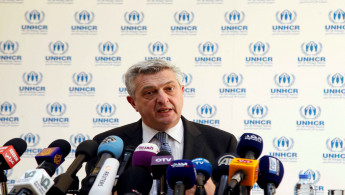UN refugee chief opposes 'safe zones' in Syria
The UN’s top official on refugees pushed back against a proposed initiative that has gained recent traction to create “safe zones” in Syria for refugees, saying the country was “not the right place” for the initiative.
“Let’s not waste time planning safe zones that will not be set up because they will not be safe for people to go back,” said Filippo Grandi, the UN High Commissioner on Refugees.
“Let us concentrate on making peace so that everywhere becomes safe. That should be the investment,” he said.
US President Donald Trump has proposed the idea of establishing safe zones as a substitute for resettling refugees in the United States and elsewhere around the globe.
The president explored schemes with Jordanian King Abdullah II in a face-to-face meeting in Washington, DC on Thursday.
Jordan is host to some 650,000 Syrian refugees.
Turkey and Lebanon, which both border Syria, are also pushing for safe zones across their borders. The two countries host 3.75 million refugees between them.
Grandi cited terrorism and the fragmentation of Syria and its warring parties as obstacles to creating working safe zones in the country.
Damascus has expressed its deep concern over the various proposals, saying they would have to be set up in coordination with the Syrian government.
Trump plunged the international refugee system into crisis last week when he issued an executive order forbidding refugees to enter the US for 120 days.
Grandi called the executive order a “dangerous weakening” of the established international norms to protect refugees.
He spoke in Beirut a day after returning from a field mission to Syria. He said the war-torn country was “devastated” and likened many urban zones to “ghost cities.”
“These are people that flee from danger, they are not dangerous themselves,” he said of refugees. The six-year-long war has displaced half the country’s population.
Grandi criticised the US and Western nations for “not doing enough” to share the burden of resettling Syrian refugees.
“(Lebanon) hosted more than 1 million people in the last three years, why can’t rich countries host even a much smaller number?” he said.





 Follow the Middle East's top stories in English at The New Arab on Google News
Follow the Middle East's top stories in English at The New Arab on Google News

![Israeli forces ordered bombed Gaza's Jabalia, ordering residents to leave [Getty]](/sites/default/files/styles/image_330x185/public/2176418030.jpeg?h=a5f2f23a&itok=_YGZaP1z)
